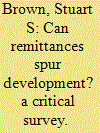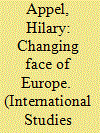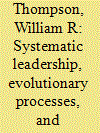| Srl | Item |
| 1 |
ID:
071654


|
|
|
|
|
| Publication |
2006.
|
| Summary/Abstract |
The increasing volume of global remittances has impressed policymakers and social scientists alike. Besides outpacing official development assistance and private capital flows, remittances have proven markedly stable and counter-cyclical. They represent an essential nondebt creating, safety-net vehicle administered by extended families and local communities rather than provincial and national governments. This essay surveys the recent pattern of remittances and critically examines the theoretical and empirical literature on their determinants and welfare impact. The argument is made that the developmental contribution of remittances can be significantly enhanced through complementary macroeconomic policies in labor exporting countries and financial innovations in remittance transmission. Enhanced policy coordination on temporary transnational worker migration-as facilitated by Mode 4 of the General Agreement on Trade in Services-can prove instrumental in helping remittances offset the traditional brain drain besetting developing economies.
|
|
|
|
|
|
|
|
|
|
|
|
|
|
|
|
| 2 |
ID:
071658


|
|
|
| 3 |
ID:
071653


|
|
|
|
|
| Publication |
2006.
|
| Summary/Abstract |
This essay addresses a prominent post-Cold War issue to which political scientists have paid relatively little attention: the status of so-called rogue states in international politics. The war in Iraq crystallized transatlantic disagreement over whether "rogue states" exist and how they should be treated, but the debate raged throughout the 1990s. This essay brings international relations theory to bear on the issue of "rogue states," but it does so with a theoretical twist. It argues that we must first identify the entity from which these states are allegedly excluded as well as who gets to set the membership criteria. If we stipulate that the international system includes all states, then international society can be defined according to various shared ideas and many realizations of international society are possible. Powerful states may try to act as "norm entrepreneurs," promoting their ideas as the basis of international society. But states, including great powers, may genuinely disagree over the basis and boundaries of this society. It is thus vital not only to take both power and shared ideas seriously, but also to describe the origins and limits of shared ideas. The limits to shared ideas can be termed "bounded intersubjectivity." This essay uses the debate over "rogue states" and the transatlantic crisis over confronting Iraq to underscore these theoretical issues
|
|
|
|
|
|
|
|
|
|
|
|
|
|
|
|
| 4 |
ID:
071652


|
|
|
|
|
| Publication |
2006.
|
| Summary/Abstract |
Scholars disagree about the nature of the current international distribution of power and its implications for world politics. Is the current system unipolar, and, if so, is unipolarity likely to persist for very long? Fifteen generalizations about the structure of the international system are culled from the literature and addressed critically from a leadership long cycle point of view. Although the current system is militarily unipolar, it is not buttressed by a new wave of radical technological innovation that is critical to the operation of systemic leadership. Until or unless US military predominance is based on economic predominance, the effects of unipolarity are likely to be relatively weak and probably also short-lived.
|
|
|
|
|
|
|
|
|
|
|
|
|
|
|
|